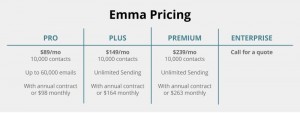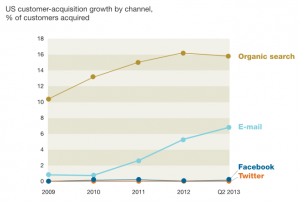
I’ve noticed a disturbing trend with some of my website search clients. When I am first brought in to look at their popular search keywords, I am noticing lots of their brand names and product names. That’s not the disturbing part. What bothers me is what I am not seeing.
For these clients who have not tackled their website search results previously, I am seeing very few unbranded, generic keywords–the so-called top-of-funnel (TOF) keywords. When I have spoken to clients about this, they are often unperturbed. They say things like, “We think they are doing their early searches in Google before they have a brand preference, and later they come to us when they know what they want.” They say this as though it’s all perfectly reasonable.
Well, it might be reasonable, but it is very bad for your brand.
Now, if you are a small company that no one knows, it makes sense that people have to find you with Google or another search engine. But if you are an established brand with a large customer base, you should not be relying to that extent on Google. Before you tell me that is unrealistic, let’s think about a few examples when you are looking for something and you probably don’t start with Google:
- A book. When you want to find a book, you probably don’t search Google. You probably search for a lot of things by going to Amazon first if you are a loyal Amazon customer. If you began going to Google to search for books, that would be very bad for Amazon, right?
- A hotel. Maybe you search Expedia or TripAdvisor but many of you don’t start with Google. Google would dearly like you to, but the travel-specific sites are fighting hard to be the place you start your decision process. Because it would be bad for them if you started with Google.
- A song. Maybe you start with iTunes or perhaps you have another site of choice, but Google is working very hard to woo you away from Apple. Why is Apple fighting back? Because it would be bad for Apple if you went somewhere else first.
Now some of you might have other places you start specific buying journeys because you are a loyal customer. Many people tell me they start searches at Walmart because they believe it is the lowest price. Some have told me they start some searches at Home Depot because they know they have a large selection and a good description of what they want to buy. These brands are not passively hoping Google will send them traffic nor are they relying on search marketing to return their existing customers to them.
But these clients I spoke to are doing just that.
When I see that your website searches are lacking top-of-funnel keywords, it means that you are ceding that whole part of the Buyer’s Journey to Google. It means that when your loyal existing customers want to come back to you to see if you can help them with something new, you are sending them to Google. No, not consciously. But if you don’t have strong content for the “Learn” stage of the Buyer’s Journey and you don’t have a search facility that is gathering those keywords and directing customers to that content, customers find someplace else to go. They find Google.
And that’s very bad for you.
Because when your loyal customers are looking for the new thing, you’d like them to come back to you first to ask. But if you are inadvertently sending them to Google, it might not be you that they find.
And remember that Google is always looking for opportunities not to send searchers to anyone at all. Remember Mapquest? You used to search for directions there. Technorati? You don’t search for blogs separately anymore, do you? And YouTube? Well, Google bought that one when it got too good.
But whether Google keeps the traffic for itself or just sends it to your competitors, why would you want that to happen when you could get loyal customers to search on your very own website? And keep the conversions for yourself?
(186)
Report Post







